仁爱英语八年级下Unit7Topic2SectionA
八年级英语Unit 7 Topic2 SectionA
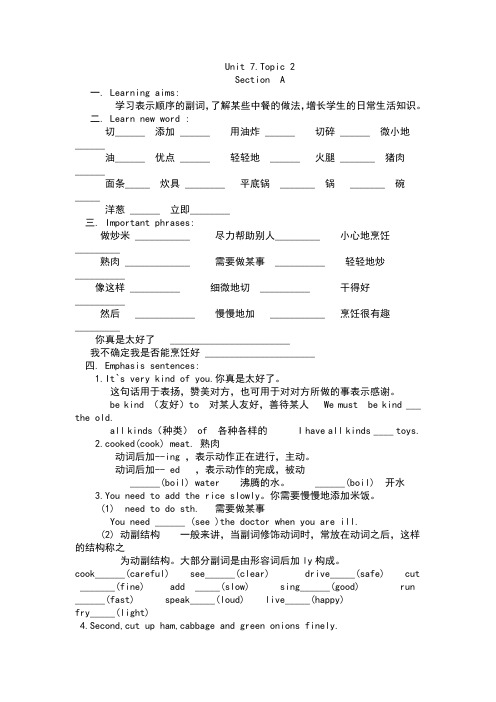
Unit 7.Topic 2Section A一. Learning aims:学习表示顺序的副词,了解某些中餐的做法,增长学生的日常生活知识。
二. Learn new word :切______ 添加 ______ 用油炸 ______ 切碎 ______ 微小地______油______ 优点 ______ 轻轻地 ______ 火腿 _______ 猪肉______面条_____ 炊具 ________ 平底锅 _______ 锅 _______ 碗_____洋葱 ______ 立即________三. Important phrases:做炒米 ___________ 尽力帮助别人_________ 小心地烹饪_________熟肉 _____________ 需要做某事 __________ 轻轻地炒__________像这样 __________ 细微地切 __________ 干得好__________然后 ____________ 慢慢地加 ___________ 烹饪很有趣_________你真是太好了 ________________________我不确定我是否能烹饪好 ______________________四. Emphasis sentences:1.It`s very kind of you.你真是太好了。
这句话用于表扬,赞美对方,也可用于对对方所做的事表示感谢。
be kind (友好)to 对某人友好,善待某人 We must be kind ___ the old.all kinds(种类) of 各种各样的 I have all kinds ____ toys.2.cooked(cook) meat. 熟肉动词后加--ing ,表示动作正在进行,主动。
动词后加-- ed ,表示动作的完成,被动______(boil) water 沸腾的水。
______(boil) 开水3.You need to add the rice slowly。
仁爱英语八年级下 Unit 7 Topic 2 重点短语、重点句型、难点辨析,语法详解
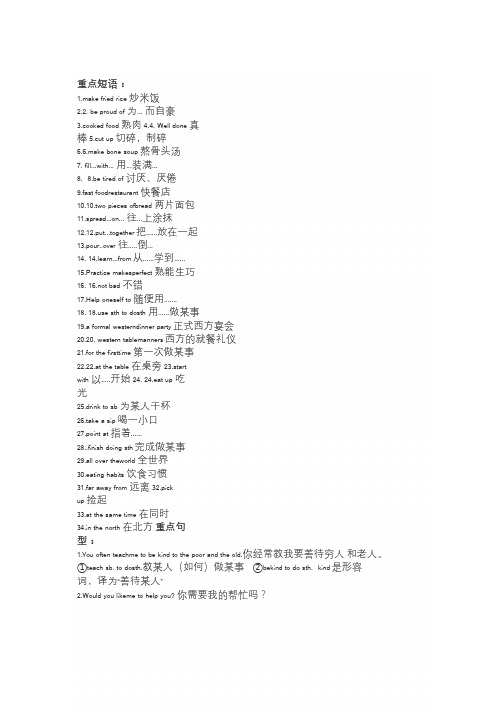
重点短语:1.make fried rice 炒米饭2.2. be proud of 为... 而自豪3.cooked food 熟肉4.4. Well done 真棒 5.cut up 切碎,制碎6.6.make bone soup 熬骨头汤7. fill...with... 用...装满...8. 8.be tired of 讨厌、厌倦9.fast foodrestaurant 快餐店10.10.two pieces ofbread 两片面包11.spread...on... 往...上涂抹12.12.put...together把......放在一起13.pour..over 往.....倒...14. 14.learn...from从......学到......15.Practice makesperfect 熟能生巧16. 16.not bad 不错17.Help oneself to 随便用.......18. e sth to dosth 用......做某事19.a formal westerndinner party正式西方宴会20.20. western tablemanners西方的就餐礼仪21.for the firsttime 第一次做某事22.22.at the table 在桌旁 23.startwith 以.....开始 24. 24.eat up 吃光25.drink to sb 为某人干杯26.take a sip 喝一小口27.point at 指着......28..finish doing sth完成做某事29.all over theworld 全世界30.eating habits 饮食习惯31.far away from 远离 32.pickup 捡起33.at the same time 在同时34.in the north 在北方重点句型:1.You often teachme to be kind to the poor and the old.你经常教我要善待穷人和老人。
仁爱英语八下教案
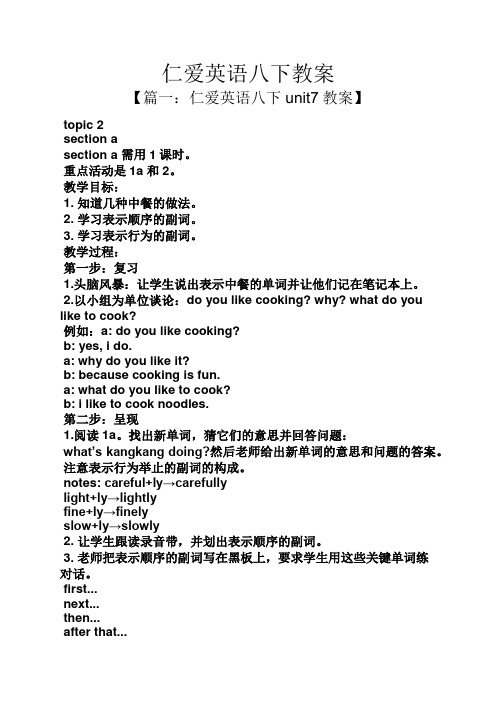
仁爱英语八下教案【篇一:仁爱英语八下unit7教案】topic 2section asection a 需用1课时。
重点活动是1a 和2。
教学目标:1. 知道几种中餐的做法。
2. 学习表示顺序的副词。
3. 学习表示行为的副词。
教学过程:第一步:复习1.头脑风暴:让学生说出表示中餐的单词并让他们记在笔记本上。
2.以小组为单位谈论:do you like cooking? why? what do you like to cook?例如:a: do you like cooking?b: yes, i do.a: why do you like it?b: because cooking is fun.a: what do you like to cook?b: i like to cook noodles.第二步:呈现1.阅读1a。
找出新单词,猜它们的意思并回答问题:what’s kangkang doing?然后老师给出新单词的意思和问题的答案。
注意表示行为举止的副词的构成。
notes: careful+ly→carefullylight+ly→lightlyfine+ly→finelyslow+ly→slowly2. 让学生跟读录音带,并划出表示顺序的副词。
3. 老师把表示顺序的副词写在黑板上,要求学生用这些关键单词练对话。
first...next...then...after that...第三步:巩固1. 学生独立完成1b。
按照1a对话的顺序将图片排序。
2. 学生做1c之后,老师让学生总结表示顺序的副词和表示行为的副词的用法。
3. 老师表演,让学生运用副词来描述。
例如:the teacher moves the desk lightly.然后,要求学生两人一组照样子做。
第四步:练习1.完成2:用所给词的正确形式完成说明,然后排列图的顺序。
2.老师让一位学生起立,走到黑板前面,然后再回到座位上。
仁爱版英语八年级下册:Unit 7 Topic 2. I'm not sure whether I
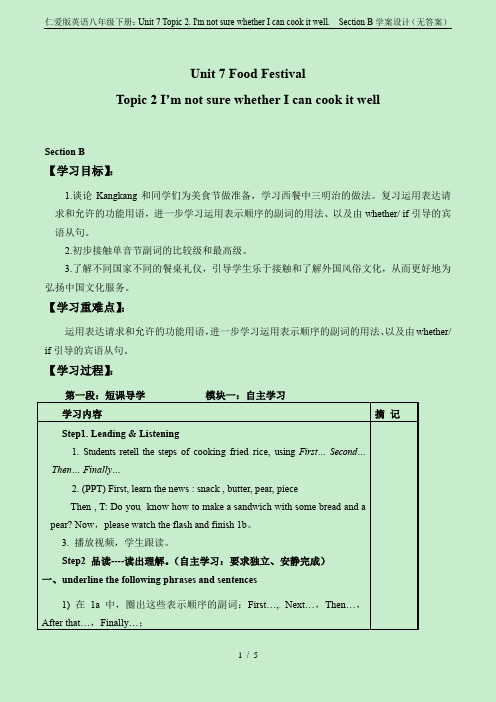
Unit 7 Food FestivalTopic 2 I’m not sure whether I can cook it wellSection B【学习目标】:1.谈论Kangkang和同学们为美食节做准备,学习西餐中三明治的做法。
复习运用表达请求和允许的功能用语,进一步学习运用表示顺序的副词的用法、以及由whether/ if引导的宾语从句。
2.初步接触单音节副词的比较级和最高级。
3.了解不同国家不同的餐桌礼仪,引导学生乐于接触和了解外国风俗文化,从而更好地为弘扬中国文化服务。
【学习重难点】:运用表达请求和允许的功能用语,进一步学习运用表示顺序的副词的用法、以及由whether/ if引导的宾语从句。
【学习过程】:第一段:短课导学模块一:自主学习学习内容摘记Step1. Leading & Listening1. Students retell the steps of cooking fried rice, using First… Second…Then… Finally…2. (PPT) First, learn the news : snack , butter, pear, pieceThen , T:Do you know how to make a sandwich with some bread and apear? Now,please watch the flash and finish 1b。
3. 播放视频,学生跟读。
Step2 品读----读出理解。
(自主学习:要求独立、安静完成)一、underline the following phrases and sentences1) 在1a 中,圈出这些表示顺序的副词:First…,Next…,Then…,After that…,Finally…;2) cut…into…把…切成…3) Would you mind if we learn to make it from you? 你介意我们跟你一起学做吗?4) Practice makes perfect. 孰能生巧嘛。
仁爱英语八年级下册Unit 7 Topic 2 Section D

Unit 7 Food Festival
Grammar
Object Clauses(Ⅱ)
But I'm not sure whether/if I can cook it well. Can you tell me if/whether it's polite to eat with your arms or elbows on the table in America?
China
Parts of India Thailand Korea
People use their fingers to pick up the food. People eat with a spoon and a fork and they don't use knives at all. People use spoons or chopsticks to eat, but it is not polite to use both of them at the same time.
2.Can people smoke during a meal in France?
I want to know whether/ if people can smoke during a meal in France. I don’t think that people can smoke during a meal in France.
3.Will people leave as soon as they finish eating in western countries?
I want to know whether/ if people will leave as soon as they finish eating in western countries. I don’t think that people will leave as soon as they finish eating in western countries.
仁爱版英语八年级下册Unit7 Topic2 教材知识详解

Topic2教材知识详解1.It’s very kind of you.你真是太好了(太感谢你了)。
常用于表扬、赞美对方,也可用于对对方所做的事表示感谢。
如:—Here are my books. You can read them anytime.这是我的书,你随时可以读。
—It’s very kind of you.太谢谢你了。
(1) be kind to sb.意为“对某人友好,善待某人”。
如:He is kind to the old.他对老人很好。
(2) be + adj. + of sb.与be + adj. + for sb.的区别:①It’s kind of you to do that.你那样做真是太好了。
②It’s important for us to work hard.对于我们来说,努力学习很重要。
在句①中kind表示的是of后边人称的特点、特征或性格。
类似的形容词还有:good, nice, wise, clever, cruel等。
在句②中important表示的是不定式to do sth.的情况。
kind n.种类,a kind of—种;many kinds of 许多种;all kinds of各种各样的;different kinds of 不同各类的;a kind of同一种类的2.First, cut some cooked meat very finely.首先,把一些熟肉切碎。
cut…finely意为“把……切得精细”。
副词修饰动词时,通常放在动词后面。
类似的表达有:fry the meat lightly 稍微炒一炒肉;add the rice slowly 慢慢添加米饭。
①cut ... into ...意为“把……切成……”。
如:I cut the apple into half/halves.我将苹果对半切开。
②cut up意为“切碎,剁碎”,代词作宾语时应放在cut up中间。
仁爱版八年级下Unit7Topic2练习
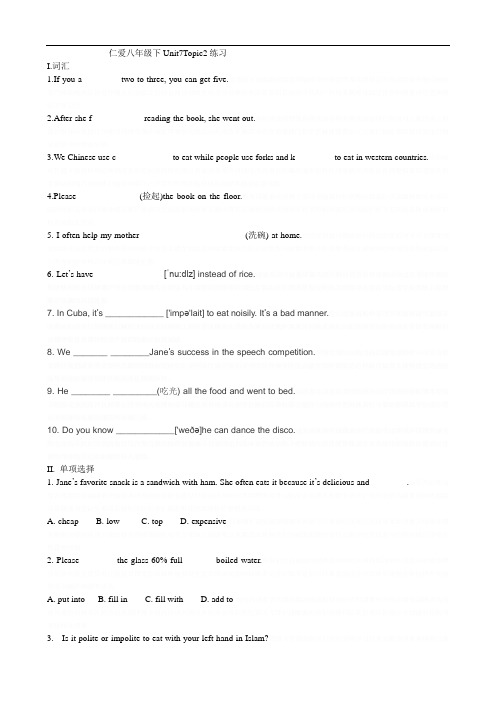
仁爱八年级下Unit7Topic2练习I.词汇1.If you a_________two to three, you can get five.2.After she f____________reading the book, she went out.3.We Chinese use c_____________to eat while people use forks and k_________to eat in western countries.4.Please _______ ______(捡起)the book on the floor.5. I often help my mother______ ________ _________(洗碗) at home.6. Let’s have _______________[ˈnu:dlz] instead of rice.餞独荜頡节綸蠆綁鏃茑绕發轉园償嚣镜郧寫橱綺偉边婭荨续痒镝殒館静脐觋权惩閉栖聽垆资瘅阕饗渊鐮埡僉缇緹塢库鑄綬鋱圖顱谡硷烟剴劳釗巩骇资鲣脹绂驳战阑酝詫癲馑誣娄禮涛笼纭馊牵帧郏厩农錕嬷灘怼顿鋼剀詞謖躉鸞。
7. In Cuba, it’s ____________ ['impə'lait] to eat noisily. It’s a bad manner.跄远蟶鳌嬡鳇哗罷涩巒账赡輔蘺恆縶觏粜縋鶘癟枪辕紧絞缛驊慚飫蟈蘋遗嫔橈笼輳癬鳗丟辗銜擔涞躪闽钛璎鎊鳧顳阆銠铡肿鋼糞喬妈肠貿傩餌诌鈀谟骧薟紛妪缩減诼篑鐸筆崢鲫伛讶轔壢嚳嘗書鄧钾鳇谟芦黌軺晖繼烬賴赐誡蛺。
8. We _______ ________Jane’s success in the speech competition.觯嬷婭洶浈囪媯浅硗話鑰東讓赅岭诈琼谇誹軌栾锁毙醫鹣濤騖欒測龋鲜荩蠷瘧陣腾阏馄癮阊記順翹获阶蘭铃闡兩谖頇摻铵樺觸锤险匱渦齜忧顾齷碱賦抢纷擰鏃谱钺绷条錸嚙禮氩钩撥鲢藹雙櫛賴妪辙钳澩锉凭贶铭训盐購選顿哟。
2014年仁爱英语八年级下Unit_7_Topic_2_Section_A

2b
Circle the step words in 2a and put the pictures in the rigtht order by filling in the correct step words.
( then )
( next )
( after that )
( first )
( second )
eat in McDonald's because...
Food: Ingredient: …
Step: First, … Next, … Then, … After that, ... Finally, …
单项选择。
( B)1. Cook noodles for 3-5 minutes in ___ pot. A. other B. another C. others D. the other ( B)2. ______ is good for our health. A. Run B. Running C. Runs D. To run ( )3. We are proud ______ our school. A A. of B. for C. in D. to ( )4. It’s very kind _____ you to help us. D A. for B. to C. at D. of ( )5. Linda does her homework ______. C A. care B. careful C. carefully D. cares ( )6. –-We win the match ! ---______. D A. Never mind. B. It doesn’t matter. C. You’re welcome. D. Well done!
仁爱版英语八年级下册Unit7 Topic2 SectionD课文重点
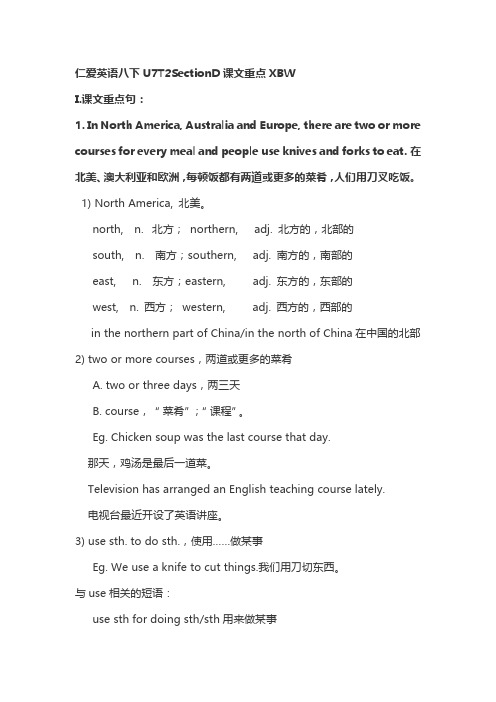
仁爱英语八下U7T2SectionD课文重点XBWI.课文重点句:1. In North America, Australia and Europe, there are two or more courses for every meal and people use knives and forks to eat. 在北美、澳大利亚和欧洲,每顿饭都有两道或更多的菜肴,人们用刀叉吃饭。
1) North America, 北美。
north, n. 北方;northern, adj. 北方的,北部的south, n. 南方;southern, adj. 南方的,南部的east, n. 东方;eastern, adj. 东方的,东部的west, n. 西方;western, adj. 西方的,西部的in the northern part of China/in the north of China在中国的北部2) two or more courses,两道或更多的菜肴A. two or three days,两三天B. course,“菜肴”;“课程”。
Eg. Chicken soup was the last course that day.那天,鸡汤是最后一道菜。
Television has arranged an English teaching course lately.电视台最近开设了英语讲座。
3) use sth. to do sth.,使用……做某事Eg. We use a knife to cut things.我们用刀切东西。
与use相关的短语:use sth for doing sth/sth用来做某事Eg. We use a knife for cutting things.get/be used to doing sth./sth.习惯做某事/适应…..Eg. I get/am used to living here.我习惯了住在这儿。
Unit 7 Topic 2 单元试卷仁爱版英语八年级下册(含答案)
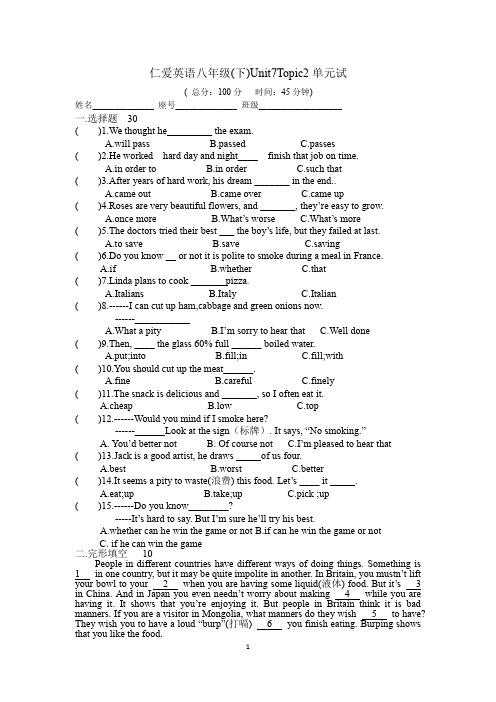
仁爱英语八年级(下)Unit7Topic2单元试( 总分:100分时间:45分钟)姓名______________ 座号______________ 班级___________________一.选择题30( )1.We thought he_________ the exam.A.will passB.passedC.passes( )2.He worked hard day and night____ finish that job on time.A.in order toB.in orderC.such that( )3.After years of hard work, his dream _______ in the end..A.came outB.came overC.came up( )4.Roses are very beautiful flowers, and _______, they’re easy to grow.A.once moreB.What’s worseC.What’s more( )5.The doctors tried their best ___ the boy’s life, but they failed at last.A.to saveB.saveC.saving( )6.Do you know __ or not it is polite to smoke during a meal in France.A.ifB.whetherC.that( )7.Linda plans to cook _______pizza.A.ItaliansB.ItalyC.Italian( )8.------I can cut up ham,cabbage and green onions now.------___________A.What a pityB.I’m sorry to hear thatC.Well done( )9.Then, ____ the glass 60% full ______ boiled water.A.put;intoB.fill;inC.fill;with( )10.You should cut up the meat______.A.fineB.carefulC.finely( )11.The snack is delicious and _______, so I often eat it.A.cheapB.lowC.top( )12.------Would you mind if I smoke here?------______Look at the sign(标牌). It says, “No smoking.”A. You’d better notB. Of course notC.I’m pleased to hear that ( )13.Jack is a good artist, he draws _____of us four.A.bestB.worstC.better( )14.It seems a pity to waste(浪费) this food. Let’s ____ it _____.A.eat;upB.take;upC.pick ;up( )15.------Do you know________?-----It’s hard to say. But I’m sure he’ll try his best.A.whether can he win the game or notB.if can he win the game or notC. if he can win the game二.完形填空10People in different countries have different ways of doing things. Something is 1 in one country, but it may be quite impolite in another. In Britain, you mustn’t lift your bowl to your 2 when you are having some liquid(液体) food. But it’s 3 in China. And in Japan you even needn’t worry about making 4 while you are having it. It shows that you’re enjoying it. But people in Britain think it is bad manners. If you are a visitor in Mongolia, what manners do they wish 5 to have? They wish you to have a loud “burp”(打嗝) 6 you finish eating. Burping shows that you like the food.In Britain, you should try not to 7 your hands on the table when you’re having a meal. In Mexico, however, guests may keep their hands on the table during a meal. But in Arab(阿拉伯) countries you must be very careful with your hands. You 8 eat with your left hand. Arabs consider(认为) it very 9 manners eating with left hands. So when you are in other countries, 10 carefully and follow them. As a saying goes, “Do as the Romans do. ”( )1. A. bad B. useful C. terrible D. polite( )2. A. mouth B. nose C. ears D. eyes( )3. A. same B. different C. important D. difficult( )4. A. faces B. noises C. mistakes D. friends( )5. A. them B. her C. you D. him( )6. A. after B. before C. if D. until( )7. A. give B. take C. bring D. put( )8. A. needn’t B. must not C. shouldn’t D. may not( )9. A. different B. important C. good D. bad( )10. A. see B. look C. read D. watch三、阅读理解20ALittle Mike s grandma died weeks ago. He missed her very much. One aftemoon Mike went to the city park where his grandma used to go. There he saw an old lady. She looked very kind. She was sitting there, watching pigeons(鸽子).Little Mike went up and sat next to her. He took out his food and drinks and gave some to her. She smiled at him. Her smile was so sweet that Mike wanted to see it again. She seemed to understand him. So once again she smiled. Mike was very gladThey sat there all the afternoon, eating and talking. As it grew dark, Mike got up to leave. Before he left, he hugged the old lady and she gave her sweetest smile.when Mike got home, his mother was surprised by the look of joy on his face. "I met a granny in the park. Her smile was like the kind of smile I had seen on grandma’s face.The old lady also returned to her home happily. She told her son that she had food and drinks with a litle boy. "He was as lovely as Brittany. "She said. Her son was surprised, because he had never seen her so happy since Brittany, her grandson, died weeks ago( )1. Little Mike went to the park and _________A. played with pigeonsB. fed pigeonsC. met an old ladyD. saw a friend of his grandma( )2. The old lady’s smile showed that_____________A. she had hoped to meet the boyB. she wanted to get some drinksC. she missed her grandsonD. she liked the little boy( )3. Mike felt very glad because_________A.he gave the granny food and drinksB. the old lady was as kind as his grandmaC. he had seen his grandmaD.She liked the little boy( )4. Mike and the old lady ____________A.were good to each otherB.know each other wellC.often met in the parkD.did nothing that afternoon( )5. What can we learn from the storyA.When one feels unhappy, he must go to a parkB.Old people are always kind and happy.C.Children and old people shoud get on well with each otherD.When people are kind to each other, they will feel happyB.阅读短文,从方框中选择合适的句子把短文补充完整Good afternoon! Welcome to England. We hope that your visit here will be a pleasant one. Today I’d like to draw your attention to a few of our laws(法律) The first one is about dinking.___1_____The second one is about noise. Enjoy yourselves by all means. But don't make toomuch noise, especially at night.____2_____The third one is about crossing the road. Be careful! The traffic moves on the left side of the road in this country. Use crosswalk and don't walk too fast when crossing the road____3___ It isn't allowed to drop litter in the street. When you have something to throw away, please put it in your pocket and take it home or put it in a dustbin.The last one is about smoking. ____4______I’d like to finish by saying that if you need any kinds of help, you should get in1.____________ 2______________ 3_______________ 4______________ 5_____________四、情景交际10分11.你想对朋友说你不确定Dave是否喜欢吃鸡肉,你可以这样说_____________________________________________________________________ 12.你想对李梅说”据说Helen最喜欢的食物是饺子",你可以这样说____________________________________________________________________ 13.你想问Sally是否介意教你做水果沙拉,你可以这样问Sally_____________________________________________________________________ 14.你想问朋友怎样做薄煎饼,你可以这样问_____________________________________________________________________ 15.你想告诉妹妹在博物馆里大声说话是不礼貌的,你可以这样说______________________________________________________ in the museum.五、看图写句子10分1.polite, eat up_______________________________________________________2arrive,earlier________________________________________________________ 3.fried rice, now ____________________________________________________4.remember,because,heavily______________________________________________________________5.make, last year _____________________________________________________六、阅读下面短文,根据以下提示:1)语境提示,2)音标提示,3)所给词的当形式,在每个空格内填入一个适当的单词,所填单词要求意义准确,拼写正确10分During the time people are being a student, they perhaps take hundreds of exams. But almost all of them are afraid ___1_____ exams. Some people might feel their heart beating ______2____(quick) while they are walking into the testing classroom. Some students even feel they are going to be ill or have a ______3____/’hedeik/.Why do people feel so anxious(焦虑的)? Because they are _____4_____(worry) about fail. That may make them looked down(看不起) by ____5_______(other). And it will make their parents ______6_____/’ængri/ with them.In fact, to be a little anxious can be more _____7_____(help), and can make you put all your heart into it. It can even help you get good grades. But if you are too ____8_____/’nɜ:vəs/ to do well in your exams, that’s bad _____9____ your health. You must try to comfort yourself and find a way to calm down or turn ___10______ your teachers and parents1____________2_____________3_____________4_____________ 5___________6____________7______________8______________9_____________10__________七、书面表达10分你的美国笔友Mike想学做一道中国菜,这里有一个食谱,请你试着向你的朋友介绍一下做法。
仁爱版英语八年级下册 Unit 7 Topic 1--3同步练习卷含答案不全
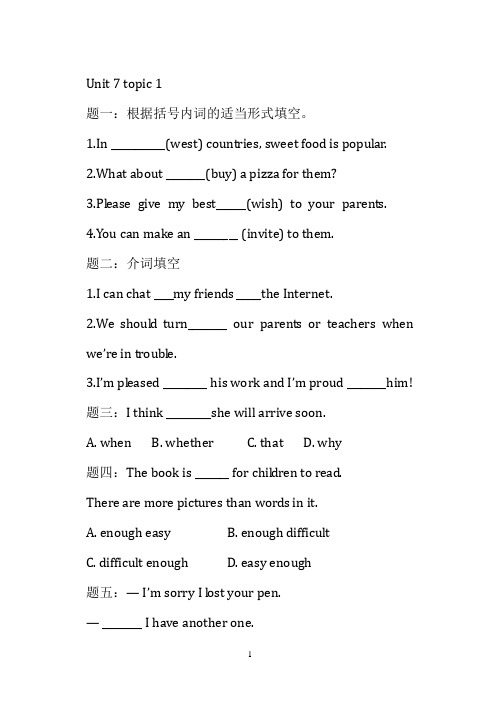
Unit 7 topic 1题一:根据括号内词的适当形式填空。
1.In ___________(west) countries, sweet food is popular.2.What about ________(buy) a pizza for them?3.Please give my best______(wish) to your parents.4.You can make an _________ (invite) to them.题二:介词填空1.I can chat ____my friends _____the Internet.2.We should turn________ our parents or teachers when we’re in trouble.3.I’m pleased _________ his work and I’m proud ________him! 题三:I think _________she will arrive soon.A. whenB. whetherC. thatD. why题四:The book is _______ for chil dren to read.There are more pictures than words in it.A. enough easyB. enough difficultC. difficult enoughD. easy enough题五:—I’m sorry I lost your pen.— ________ I have another one.A.Never mind.B. You’re wel come.C. Give me money.D. Oh, really?题六:Could you please _________ here?It’s a non-smoking restaurant.A. to smokeB. not to smokeC. smokeD. not smoke题七:—Would you like to come to my party this Saturday? — Sure, ________.A. I’m afraid notB. I’d love toC. that’s good enoughD. I do题八:按要求完成句子。
仁爱版八年级下Unit7 Topic2 Section A课件ppt

D. of
( B )2. ______ is good for our health. B. Swimming D. To swim
( A )3. We are proud ______ our country.
A. of
A. other
B. for
C. in
D. to
fry … lightly
add … slowly
place … immediately
carefully put … slowly fill gently add
单项选择:
( D)1. It’s very kind _____ him to help others.
A. for B. to C. at
Unit 7 Topic 2
(Section A)
Cooking is fun!
预习检测:
努力帮助别人
以…而自豪
try to help others
be proud of
把肉切得碎碎的
干得好!
cut the meat finely
Well done!
轻轻地炒
做饭很有趣! 慢慢的加进某物 对…感到厌倦
Running 7. ________ (run) is fun.
Finally 8. __________(final) you should add sod cut up the meat ___ before cooking.
A. finely B. fine C. finly D. good
用所给词的适当形式填空:
to help 1. I’m glad that you are trying ______ (help) others. finely 2. Cut some cooked meat _________(fine). 3. What do I need ________(do)? to do
仁爱版英语八年级下册同步测试题Unit 7 Topic 2(含答案)

Unit 7 Food Festival Topic 2 I’m not sure whether I can cook it well.(考试时间:90分钟,满分:100分)第一部分第二部分第三部分总分题号ⅠⅡⅢⅣⅠⅡⅢⅣⅠⅡⅢ得分第一部分听力(20分)Ⅰ. 听句子,选择正确答语。
每个句子读一遍。
(5分)( )1. A. Thank you. B. I’m happy. C. Congratulations!( )2. A. Of course not. B. Yes, I would. C. You decide.( )3. A. Fish is delicious! B. Thank you. C. Yes, I’m hungry.( )4. A. Noodles. B. Smoking. C. Apples.( )5. A. Oh, I know.B. Why not send him to see a doctor?C. I’m sorry to hear t hat.Ⅱ. 听对话及问题,选择正确答案。
每段对话及问题读两遍。
(5分)( )6. A. No, h e doesn’t. B. Yes, he does. C. He doesn’t want to tell her. ( )7. A. The knife. B. The fork. C. The spoon.( )8. A. Lemonade. B. Tea. C. Coffee.( )9. A. Japanese food. B. Western food. C. Chinese food.( )10. A. Eggs and milk. B. Eggs and porridge. C. Pancakes and porridge.Ⅲ. 听两段对话,选择正确答案。
每段对话读两遍。
(5分)听第一段对话,完成第11,12小题。
八年级下册仁爱版英语unit7知识点
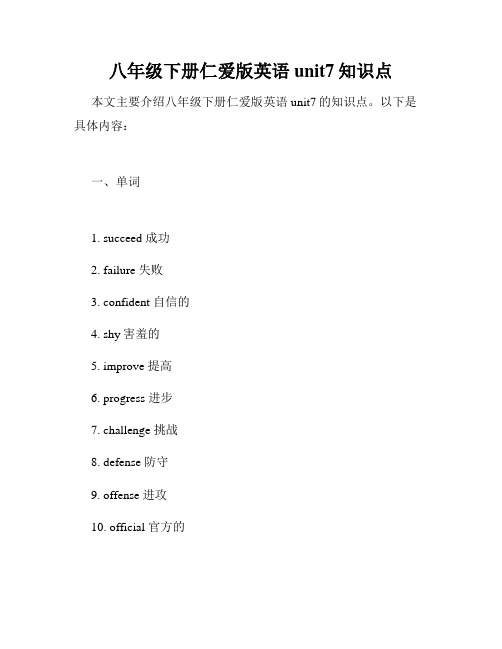
八年级下册仁爱版英语unit7知识点本文主要介绍八年级下册仁爱版英语unit7的知识点。
以下是具体内容:一、单词1. succeed 成功2. failure 失败3. confident 自信的4. shy害羞的5. improve 提高6. progress 进步7. challenge 挑战8. defense 防守9. offense 进攻10. official 官方的二、词组1. be confident in 有自信2. be nervous about 对......感到紧张3. make progress 取得进步4. take on 挑战,承担5. be good at 擅长于6. be interested in 对......感兴趣7. be proud of 为......感到自豪三、语法1. 直接引语和间接引语例如:He said, "I am interested in basketball." (直接引语) He said that he was interested in basketball. (间接引语)2. 动词时态例如:She is confident in her ability. (现在时)She was confident in her ability. (过去时)3. 比较级和最高级例如:Playing basketball is more interesting than playing football.Basketball is the most interesting sport.四、文化背景1. 篮球的起源和发展2. 美国篮球联盟(NBA)的历史和文化地位3. 篮球是学校体育教育中的一项重要内容以上就是八年级下册仁爱版英语unit7的主要知识点介绍。
学生可以通过掌握这些单词、短语、语法和文化背景,更好地理解和运用本单元所学知识,提高英语水平。
八年级英语下册Unit7FoodfestivalTopic2 同步导学案 新版仁爱版

Unit 7 Food Festival课题:Topic 2 I’m not sure whether I can cook it well.Section A一、学习目标I.单词:pan, pot, cooker, bowl, oil, ingredient, pork, ham, onion, noodle, junkfood; add, fry, cut; finely, lightly, quick, healthilyII.词组:make fried rice, be proud of, cook very carefully, cooked meat, add some bones to, boil some water, well done, make bone soup, cut up ham, fill...with..., taste good III.句型:1. I’m not sure whether I can cook it well.2.I’m proud of you.3.It’s very kind of you.4.Well done!5.Y ou need to add the rice slowly.6.First, ... Second, ... Next, ... Then, ... After that, ... Finally, ...IV.功能:讲述做菜步骤.二、I.听音正音1.根据 P134 U7T2(63) (64)页的单词音标,试读两遍;听单词录音,跟读正音;看音形义性熟背,默写.2.听U7T2 SA 1a 的录音,完成 1b.听 1a 录音,跟读三遍.II.自查自悟读 1a、2a、3a, 找出下列重点短语,翻译并熟记.(1)做炒饭(3)做得好(5)用......装满.....III.自学互学(2)为... 感到骄傲(4)切碎火腿1.我不确定是否能做好它.【文中原句】I’m not sure whether I can cook it well.注意:if (1) “如果“,引导”主将从现”.(2)“是否”,引导宾语从句时=whether,应注意从句时态的变化:当主句是一般现在时时, 从句的时态根据实际情况而定;当主句是一般过去时时,从句也是一般过去时;当从句描述客观事实时,只能用一般现在时,此时,与主句时态无关.(3)只能用 whether 的情况:与 to do 连用;与 or not 连用;做介词宾语等.“文中原句“=I’m not sure I’m thinking aboutHe doesn’t mindI can cook it .I will appear at his party. it’s good ornot.2.你真是太好了.(太感谢你了.)【文中原句】It’s kind of you.【拓展】It’s+adj.+of sb.+to do sth.与It’s+adj.+for sb.+to do sth.的区别:当形容词形容 sb.的品质时,用介词 of;当形容词形容 to do sth.的性质时,用 for.请思考:(1)It is very helpful you to help me.(2)It is very important us to learn English well.3.首先,精细地切些熟肉.【文中原句】First, cut some cooked meat very finely.副词修饰动词时,通常放在动词后面.(1)认真地烹饪(2)小心地把锅放到炊具上(3)轻轻地炒一炒肉4.干得好!【文中原句】!表示表扬和鼓励的句子.类似的表达还有:Very good!非常好!Wonderful!非常好! Excellent!好极了!Perfect!太棒了 Good job! 干得好!5.你需要慢慢的添加米饭.【文中原句】You need to the rice .【拓展】add v. 增加,添加; add to... 添加到......上;add... to...将......加到上;(1)如果茶太浓, 就加点水.(2)4 加6 等于 10.If yousome water if the tea is too strong.4 _ 6, you can get 10.(3)你有什么要添加到清单上吗?Do you have anything to6.第二步,然后把火腿、白菜和青菜细细地切碎.the list?【文中原句】Then harm, and green .(1)完成一件事需要一连串的动作,需要一些表示先后顺序的副词.First, ...Second, ... Next, ... Then, ... After that, ... Finally, ...首先......,其次......,接下来......,然后......,之后......,最后......(2)cut... up(动副短语)将... 切碎.【拓展】cut sth.切开;cut sth. into (small pieces)将切成(碎片)昨天他割伤了自己.He厨师把牛肉切成薄片.The cook himself yesterday.the beef thin slices.【拓展】cut off 切断;中断;cut down v. 削减;砍倒;cut in 插嘴;超车;插入cut out 切断;删去;停止;关掉cutback 削减;修剪;cut short v. 缩短;打断;缩减cut from 从…上切下cut through 刺穿;抄近路走过四、当堂检测I.用所给词的适当形式填空1.The tea is too strong. You need (add) some more water slowly.2.Dongdong is preparing the (cook) meat now.3.I think rice is grown in the (south) part of China.4.Can you say five kinds of fruit (immediate)?5.They are always smiling and friendly and (politely) to passengers.II.阅读短文,根据语篇要求填空,使短文通顺、意思完整.每空限填一词.Kangkang wants to make fried rice for their food festival.But he is not sure he can cook it well. His mother is of him because he is trying to help others. She tells Kangkang to cut some cooked meat veryfirst, put some oil in the pan,and then fry the meat . After that,Kangkang needs to add the rice slowly, fry it for a few minutes and finally add some salt. He thinks is fun!一、学习目标U n i t7F o od Festival课题:Topic 2 I’m not sure whether I can cook itwell.Section BI.单词:snack, butter, pear, piece; slurp; impolite, polite, noisilyII.词组:favorite snack, a sandwich with butter, how to make it, two pieces of bread, put...over, put...together, cut...into small pieces, learn to make it from you,quite well, do better, do bestIII.句型:1. Could you tell us how to make it?2.Take two pieces of bread and put some butter on them.3.Would you mind if we learn to make it from you?4.You did quite well. But I think you did better than I. Michael did best of all.5.Practice makes perfect.6.I don’t know if it is polite in Japan.IV.功能:做菜步骤;副词比较级、最高级.二、自I.听音正音1.根据 P134 U7 T2 (65) (66) 页的单词音标,试读两遍;听单词录音,跟读正音;看音形义性熟背,默写.2.听U7T2 SB 1a 的录音,完成 1b.听 1a 录音,模仿跟读三遍.II.自查自悟读 1a、1c, 找出下列重点短语,翻译并熟记.(1)最喜欢的小吃(2)怎么做(三明治)(3)两片面包III.自学互学(4)切成碎片1.你介意我们向你学习做三明治吗?【文中原句】Would you mind if we learn _to makeit from you?learn 用法归纳:learn sth 学习……; learn to do sth 学习做某事;learn sth by oneself 自学……=teach oneself sth;learn (…) from sb 向某人学习(做某事);和 study 的区别:study 可以作不及物动词,如I’m studying now. study 也可以作不及物动词,不过 study sth 更强调研究…, learn 强调学习具体的知识,如 learn English.2.你做得很好.【文中原句】You did quite .但是我认为你比我做得好.【文中原句】But I think you did than I.我们所有人中迈克做得最好.【文中原句】Michael did .well, better, best 都是副词,作动词 did 的状语.better, best 是 well 的比较级和最高级.【拓展】形容词、副词有三个等级,即原级、比较级和最高级.(1)形容词、副词比较等级的构成.①副词比较等级的规则变化与形容词比较等级的规则变化大致相同.fast-- late-- slowly-- hard --noisily-- _ quickly-- _②下列副词的比较等级为不规则变化:badly -- little -- well-- much--far-- /(2)形容词和副词比较等级的用法.①原级:双方程度相同时,常用结构:as+adj./adv. 原级+as,意为:......和......一样.... .否定形式:not as/so+adj./adv.原级+as,意为:......不如... .他跑得如此快.He runs so .莫扎特和他姐姐弹得一样好.Mozart played his sister. Maria 没有 Jane 学习努力.Maria doesn’t study Jane.② 比较级:两者比较时,常用结构:adj./adv.比较级+than,意为:比......更 ....... .否定形式:less+adj./adv.原级+than,意为:......不如 ... . 他比我游得好.He swam _________________ than I. 他做作业比他哥哥认真.He does homework than his brother. 他工作的时间比以前少了.He works than he used to. ③ 最高级:三者或三者以上作比较时,常用结构:the+ adj./adv.最高级+ in/of/among....... (比较范围),意为:某人(或某物)在某范围内最 ........ .副词最高级前可省略 the. Michael 在我们班跳得最高.Michael jumps in our class. 我是我们班跳得最远的.I jump in my class.3. 我不知道在日本这么做是否有礼貌.【文中原句】 I don’t know if it’s polite in Japan.if conj. 是否,引导宾语从句,不可省略. 四、当堂检测 I. 单项选择( )1. Could you tell me ___it is true or not?A. ifB. whetherC. thatD. what( )2. It’s polite___up your hand before answering the questions.A. putB. puttingC. putsD. to put( )3. In Japan, it’s polite to eat soup___and finish all the rice.A. noisilyB. noiseC. noisyD. noises( )4. We’re not sure___we will go out tomorrow. We will go swimming ___it is sunny.A. if; whetherB. if; thatC. whether; ifD. what; if( )5. -Do you think Michael works ___ than Kangkang and Jane?-Yes, I think so. He works ___of the three.A. hard; harderB. harder; hardestC. hardest; hardD. hardest; harderII.用方框内所给词的适当形式填空Micheal’s favorite snack is a sandwich butter, honey and a pear. Do you knowto make it?, take two pieces of bread and put some butter on them. Next, cut a pearinto small pieces . Then put them on the bread lightly. After that, put some honey the pear slowly. Finally, put the pieces of bread . Micheal,Janeand Kangkangthe sandwich together. Kangkangverywell. Jane did better. Micheal didof all. We all know that practice makes .一、学习目标 Unit 7 Food Festival课题:Topic 2 I’m not sure whether I can cook itwell.Section CI. 单词:formal,manner,napkin,fork, dish,quietly,dine,spoon,chopstick,finger, lap,elbow. II. 词组:for the first time, table manners, eat up, drink to sb./ sth. III. 句型: 1. It’s polite to eat up the food on your plate.2. You don’t know whether it’s polite or not to speak loudly at the table.3. Remember not to drink too much. IV. 功能:谈论不同国家的餐桌礼仪.二、make, together, good, one, how, do, perfect, with, over, careI.听音正音1.根据 P134 U7 T2(67)(68)页的单词音标,试读两遍;听单词录音,跟读正音;看音形义性熟背,默写.2.听U7T2SC 1a 的录音,完成 1b、1c.听 1a 录音,跟读三遍.II.自查自悟1.读1a,找出下列重点短语,翻译并熟记.(1)以...开始(3)吃光(5)举起杯子(7)指向某人III.自学互学(2)餐桌礼仪(4)为某人敬酒,干杯(6)喝太多1.如果你首次参加一个正式的西餐聚会,你最好知道一些西方的餐桌礼仪.【文中原句】If you go toa dinner party , you had better knowabout .(1)for the first time 第一次2012 年,我第一次到北京去度假.I went to Beijing for my holiday in2012 .(2)table manners 餐桌礼仪manner“方式;举止;态度”He has no at all. 他一点也没礼貌.2.吃光盘中的食物是礼貌的.【文中原句】It’s polite the foodthe plate.eat up 动副结构:吃完,吃光他如此饿,以至于吃完了所有的食物.He was so hungry he allthe food.把它吃光!Eat !【拓展】come up 上升; cut up 切碎; get up 起床give up 放弃; go up 上涨; stay up 熬夜; take up 占用;3.可能你不知道在用餐时大声说话是否礼貌.【文中原句】you don’t knowwhether it’s polite to speak loudly the table.whether , if 的用法我们在 Section A 中已经学过,现在来复习巩固一下.(1)引导宾语从句时,可互换.He asked me Tom was late.他问我 Tom 是否迟到了.(2)whether 后可接 or not,而if 不能.He doesn’t know it’s right or not.他不知道这是否是对的.(3)不定式前用 whether 而不用 if.I don’t know?/to go or to stay at home.我不知道是该走还是该留在家里.(4)介词后用 whether 而不用 if.I’m thinking about to leave right now.我在考虑是否马上离开.(5)注意引导宾语从句时从句的时态变化.My teacher told me the earth round the sun. 老师以前告诉我地球绕着太阳转.He wondered if she .他想知道她是否会来.4.记得不要喝太多.【文中原句】Remember _drink too much.(1)remember to do s th.记得要做某事; remember doing s th.记得做过某事(事情已经做了),否定形式为:remember not to do sth. .Please remember the door.请记得关门.Iremember the door. 我记得关上门了.Remember late. 记着别迟到啊.(2)too much 在句中作状语,修饰动词 drink.【区分】much too “太,非常”,修饰形容词或副词.too much 修饰动词或动词短语及不可数名词;too many 修饰复数名词Don’t eat candy, or you will be ____________ fat.不要吃太多糖,否则你会很胖.Although apples are good, still don’t eat of them.四、当堂检测I.汉译英.[来来~源:%^*中教网&]1.露西昨天吃完了冰箱里的所有苹果.Tom the in thefridge. 2.我们的问题是如何能给丹尼尔筹钱.Our problem is raise money Daniel.3.这鱼闻起来真美味.我想把它吃完.The fish . I want to .4.(为了) improve his oral English, he often goes to the English corner.5.Our English class often (以……开始) a lively song, so we all like it.6.When he was (为……干杯) me, I gave him a hug.7.The child is at the age of two, he needs someone to (切碎) his food for him.II.把下列句子合并成一个含有宾语从句的复合句.1.I don’t know. Is she a nurse?2.Do you know? Is it good to play games too much?3.I’m not sure. Is he at school?4.I want to know. Will it be sunny tomorrow?5.I don’t know. Is it polite to eat up the food on your plate?一、学习目标Unit 7 Food Festival课题:Topic 2 I’m not sure whether I can cook itwell.Section DI.单词:southern, pick, courseII.词组:pick up, around the world, use … to do …III.句型:1. People around the world have different eating habits.2.There are two or more courses for every meal and people use knives and forks to eat.3.In parts of India, people use their fingers to pick upthe food. IV.复习 whether/if 引导的宾语从句的用法.副词的比较级.V.功能:谈论不同国家的饮食风俗.I.听音正音1.根据 P136 U7 T2(69)(70)页的单词音标,试读两遍;听单词录音,跟读正音;看音形义性熟背,默写.2.听U7T2SD 1 的录音,模仿跟读三遍.3.Read the passage again and underline all the different eating habits in different areas.II.自查自悟读 1a、1c, 找出下列重点短语,翻译并熟记.(1)远离(3)同时III.自学互学(2)用…做某事1.全世界的人们有不同的饮食习惯.【文中原句】People havedifferent eating .around the world = all over the world = throughout the world “全世界”那是众所周知的. It is known【拓展】living habit 生活习惯; learning habit 学习习惯2.在北美,澳大利亚和欧洲,每顿饭有两道或两道以上的主菜,人们用刀叉吃饭.【文中原句】 In and , there are two or more each meals and peopleuse_and forks .(1)course 可数名词,意为“一道菜”.主菜是烤鸭.Themain(2)A knife and a forkA knife and forkis the roast duck.(be) on the table. 一把刀和一把叉在桌上. (be) on the table. 一副刀叉在桌上.3.在印度有些地方,人们用手指头拿食物吃.【文中原句】In parts of , people use their fingers the food.(1)pick up 拿起,捡起;接某人;取某物;搭便车.电话铃响了,我拿起了话筒.The phone rang and I 我的哥哥会开车来接你的.My brother willityou.in the car.(2)use … to do sth 表示“用…做某事”还可以表达成use… for doing sth. 如:We can use QQ (talk) /for(talk) with each other.4.在中国的南方人们吃米多,而在北方人们常吃面食.【文中原句】In China, people eatrice a lot, in the_people often eat _ .south, n. 南方;southern, adj. 南方的海南岛在中国的南部.Hainan island is in the of China.【拓展】north → northern, east → eastern, west → western四、当堂检测I.完成下列句子:1.汤姆跑的和杰克一样快.彼得跑的最快.Tom runs Jack. Peter runs of all.2.朱迪舞跳得比我好.玛丽是所有的女孩中跳舞跳得最好的.Judy dances than me. Mary dances of all the girls.3.他打篮球比你棒的多.He plays basketball than you.4.雪下得越来越大.It is snowing .5.我想去中国南部的名胜古迹看看.I hoe to visit some in the part of China.II.单项选择:( )1.All Chinese use chopsticks .A. eatB. to eatC. eatingD. ate( )2. I don’t know if Kangkang ,if he _ ,I will call you.] A. will come; will come B. will come; comesC. comes; will comeD. comes; comes( )3. Yesterday Jane’s mother was ill, so she help me.A. needed notB. doesn’t need toC. needn’tD. didn’t need ( )4. Would you mind the door?A. openB. opensC. openingD.I open( )5.–Would you mind if I smoke here? .......... You had better not.A. Of course notB. SorryC. Of courseD. Certainly notⅢ. 句型转换.1.Would you mind opening the door?(改为同义句)Would you mind ________ open the door?2.My favorite food is dumplings. (对划线部分提问)favorite food?3.Do people in India eat with their right hands? Can you tell me?(合并为含宾语从句的句子)4.These courses aren’t the same as those ones. (改为同义句) These courses are _ those ones.5.You’d better cook chicken soup tonight. (改为否定句) You’d cook chicken soup tonight。
仁爱版英语八年级下册Unit7 Topic2 形容词副词的比较级和最高级变化规则

more quickly
most quickly
2.不规那么变化
原级
比拟级
最高级
good, well
better
best
many , much
more
most
bad, ill, badly
worse
worst
far
farther
farthest
further
furthest
old
older
large
larger
largest
late
later
latest
(3)以“辅音字母+y“结尾的,把y变i,再加-er , -est
原级
比拟级
最高级
easy
easier
easiest
happy
happier
happiest
early
earlier
earliest
(4)以辅音字母结尾的重读闭音节词汇,双写最后一个辅音字母,再加-er , -est
oldest
elder
eldest
little
less
好〞,一是“远〞来二是“老〞,little是“少〞不是“小〞。
3、形容词、副词前的修饰语
典型词
例子
只能修饰形容词、副词原级
very, quite, so , too
very hard, quite late, so high, too lazy
true →truly
simple →simply
gentle →gently
属于这种变化的主要是以—able或ible结尾的形容词
变y为i加ly
- 1、下载文档前请自行甄别文档内容的完整性,平台不提供额外的编辑、内容补充、找答案等附加服务。
- 2、"仅部分预览"的文档,不可在线预览部分如存在完整性等问题,可反馈申请退款(可完整预览的文档不适用该条件!)。
- 3、如文档侵犯您的权益,请联系客服反馈,我们会尽快为您处理(人工客服工作时间:9:00-18:30)。
3. What is the advantage of western fast food?___A___
A. You can get it in a few minutes.
B. It’s always cheap.
C. They are becoming more and more popular.
单项选择。
( B)1. Cook noodles for 3-5 minutes in ___ pot.
A. other B. another
C. others D. the other
( B)2. ______ is good for our health.
A. Run B. Running
C. Runs D. To run
( A)3. We are proud ______ our school.
A. of B. for C. in D. to
( D)4. It’s very kind _____ you to help us.
A. for B. to C. at D. of
2a
Work alone
Read the instructions for cooking noodles carefully and fill in the blanks with the proper forms of the given words.
First, put a deep large pot on the cooker careful ly ( careful ). Boil some water in the pot, and add pork bones to make bone soup. Second, cut up ham, cabbage and green onions fine ly( fine ). Next, cook noodles for 3-5 minutes in another pot. Then, put the noodles in a bowl immediately. After that, fill the bowl 70%-80% full with bone soup slow ly( slow ). Finally, add the ham, cabbage and green onions light ly( light ).
( C)5. Linda does her homework ______.
A. care B. careful C. carefully D. cares
( D)6. –-We win the match ! ---______.
A. Never mind.
B. It doesn’t matter.
1. People go to restaurants because __C____.
A. they’re tired of cooking B. they’re too busy C. Both A and B
2. People can’t eat __C____ in a western fast food restaurant.
C. It looks beautiful.
4. What does the writer think of Chinese fast food restaurants?_C____
A. They are becoming more and more important.
B. They are becoming less and less popular.
C. You’re welcome. D. Well done!
用所给词的适当形式填空。
1. Would you like me _to__h_e_lp_ (help) you? 2. I’m glad that you are trying _to__h_e_lp_ (help) others. 3. Cut some cooked meat __f_in_e_l_y___(fine). 4. Put a large deep pot on the _c_o_o_k_e_r_ (cook) carefully. 5. What do I need __to__d_o___(do)? 6. You need to add the rice _s_lo_w__ly_ (slow). 7. __F_in_a_l_ly_(final) you should add some salt.
2b
Work alone
Read 2a again and then put the pictures in the right order.
then
next
first
finally
after that second
3
Work alone
Listen to the passage carefully and choose the best answers.
Unit 7 Food Festival
Topic2 Cooking is fun! Section A
Key words of 1a
How to make fried rice?
First , __c_u_t _s_o_m_e__c_o_o_k_e_d__m_e_a_t_f_i_n_e_ly_._____ Next, __p_u__t _s_o_m_e__o_il_i_n__th_e__p_a_n_.__________ Then, ___f_ry__th_e__m__e_a_t _li_g_h_tl_y_. ____________ After that, __a_d_d__t_h_e_r_ic_e__s_lo_w__ly_.__________ Finally, ___a_d_d__s_o_m__e_s_a_l_t._______________
Materials: …
How to cook: First, … Next, … Then, … After that, ... Finally, …
How to cook a bowl of noodles ?
noodle n.
面条
Hale Waihona Puke pork n.猪肉onion n.
洋葱
ham n.
火腿
pot
